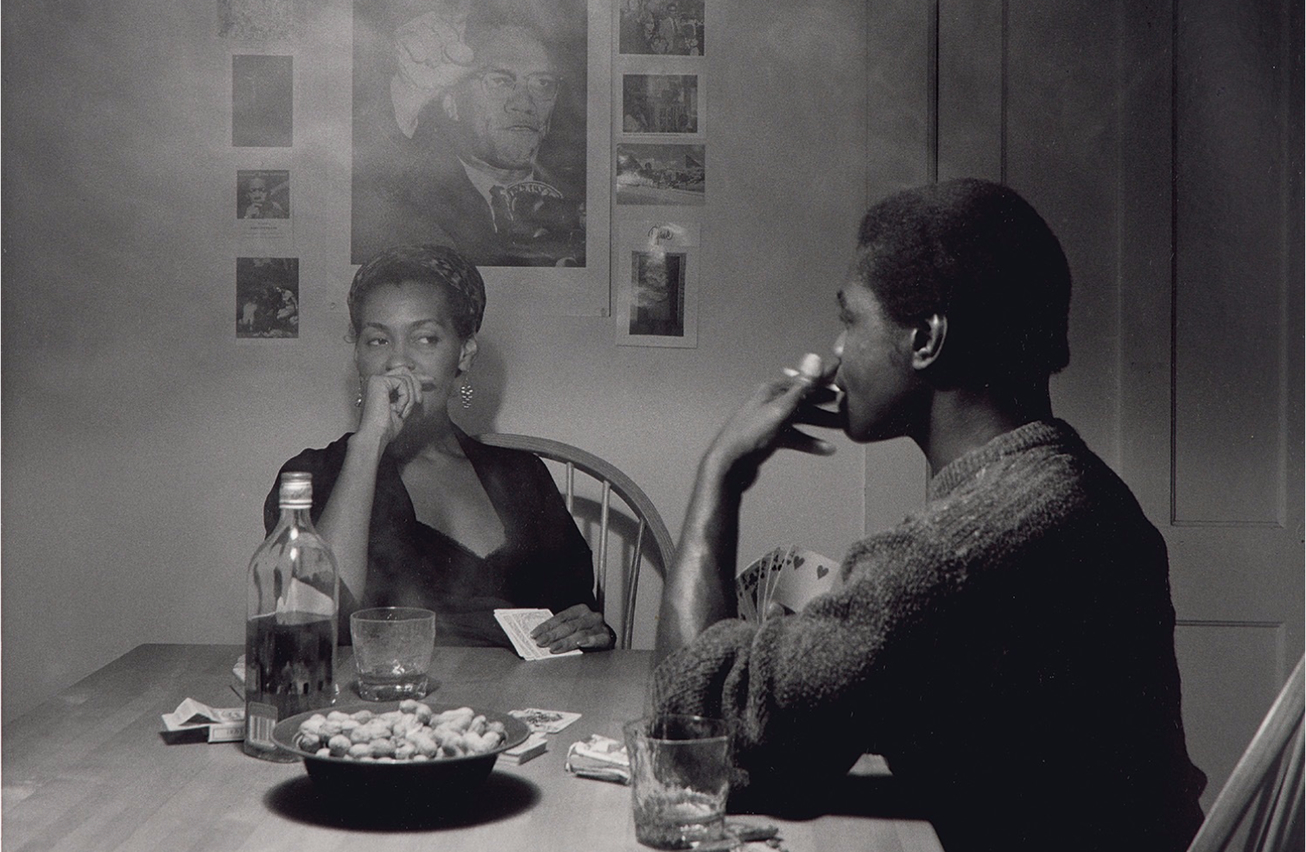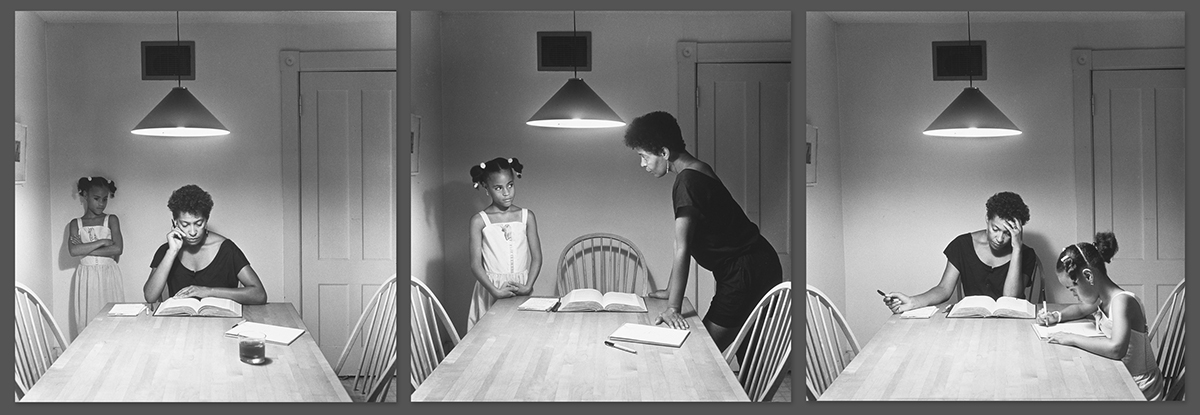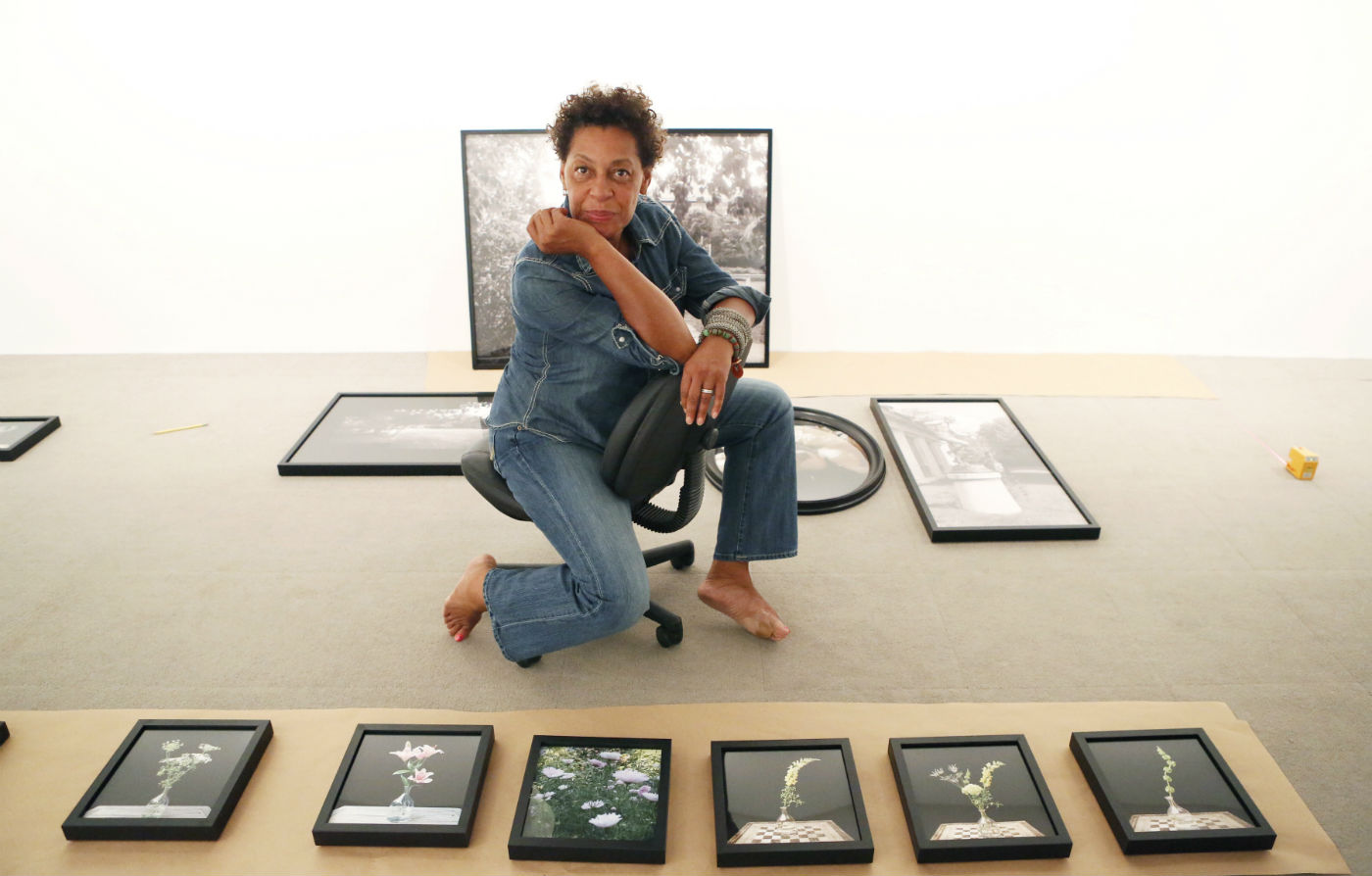Carrie Mae Weems is an American artist known for her powerful and thought-provoking work in photography, video, and installation. She rose to prominence in the 1990s with her groundbreaking series, the Kitchen Table Series, which explored themes of race, gender, and identity through intimate and personal narratives. Throughout her career, Weems has used her art to challenge societal norms and shed light on the experiences of marginalized communities. She is considered one of the most influential and innovative artists of our time, and her work continues to inspire and provoke conversations about important social issues.Carrie Mae Weems
The Kitchen Table Series is a collection of photographs that Weems created in the late 1980s and early 1990s. The series features staged scenes of a woman, played by Weems, interacting with her family and friends around a kitchen table. At first glance, the photographs may seem like simple domestic scenes, but upon closer inspection, they reveal complex and layered narratives about race, gender, and relationships. Weems uses the kitchen table as a metaphor for the center of family life and the place where important conversations and decisions take place. The Kitchen Table Series was a groundbreaking body of work that challenged traditional notions of family and domestic life. It was also one of the first times that African American women were represented in such a raw and honest way in the art world.Kitchen Table Series
One of the most powerful and recurring themes in the Kitchen Table Series is the relationship between mother and daughter. Weems explores the complex dynamics of this relationship and the ways in which it is shaped by societal expectations and stereotypes. In one photograph, Weems and her daughter are seen sitting at the kitchen table, with Weems looking at her daughter with a mix of love and concern. The image captures the complicated emotions and responsibilities that come with being a mother, especially for African American women. The Kitchen Table Series also challenges traditional ideas of motherhood and highlights the strength and resilience of African American mothers. Weems portrays them as multifaceted individuals with their own hopes, dreams, and struggles.Mother and Daughter
As a photographer, Carrie Mae Weems has a unique ability to capture powerful and emotionally charged moments in her work. She is known for her use of light and shadow, as well as her masterful storytelling through composition and subject matter. Through her lens, Weems is able to capture the complexities of the human experience and bring to light important social issues. She blurs the lines between reality and fiction, challenging viewers to question their own perceptions and biases. The Kitchen Table Series is a perfect example of Weems' mastery of photography as a medium for storytelling. Each photograph tells a unique and compelling story, inviting viewers to step into the intimate and personal world of the characters.Photography
As an African American artist, Carrie Mae Weems uses her work to explore and confront issues of race and representation. She often incorporates elements of African American culture and history into her pieces, giving a voice to those whose stories have been silenced or ignored. The Kitchen Table Series is a prime example of Weems' exploration of African American identity. Through her self-portrait and the portrayal of her family and friends, she challenges the narrow and often stereotypical representations of African Americans in mainstream media and art. Weems' work also sheds light on the complex and varied experiences within the African American community. She celebrates the beauty and resilience of African American culture, while also acknowledging the struggles and injustices faced by its members.African American
Family is a central theme in the work of Carrie Mae Weems, and it is particularly prominent in the Kitchen Table Series. Weems challenges traditional notions of family and the roles that individuals play in a family unit. In one photograph, Weems is seen holding a baby, but she is not portrayed as a traditional mother figure. Instead, she appears strong and confident, challenging the expectations placed upon women in their roles as mothers and caregivers. The Kitchen Table Series also highlights the importance of chosen family and the relationships we form outside of traditional family structures. Through her depiction of close friends and their interactions at the kitchen table, Weems shows the importance of these relationships in shaping our identities and experiences.Family
Domestic life is a recurring theme in the work of Carrie Mae Weems, and it is particularly prominent in the Kitchen Table Series. Weems challenges the idea of the home as a safe and comfortable haven, and instead, presents a more complex and often tumultuous reality. The kitchen table, a symbol of domestic life, is often portrayed as a place of both comfort and conflict in the series. Weems' use of props and body language within the photographs adds to the tension and complexity of these domestic scenes. Through her depiction of domestic life, Weems also addresses issues of gender roles and expectations within the home. She challenges traditional notions of what it means to be a wife, mother, or daughter, and encourages viewers to question and challenge these societal norms.Domestic Life
Identity is a central theme in the work of Carrie Mae Weems, and it is intricately woven throughout the Kitchen Table Series. Through her self-portrait and the portrayal of her family and friends, Weems explores the complexities of individual and collective identities. The series challenges viewers to question their own perceptions and assumptions about identity, particularly in relation to race and gender. Weems' use of staging and performance within the photographs also highlights the constructed nature of identity and the ways in which it is shaped by society and societal expectations. The Kitchen Table Series also celebrates the diversity and uniqueness of individual identities within a larger community. Weems' work encourages viewers to embrace and celebrate their own identities, while also recognizing and respecting the identities of others.Identity
Race is a recurring theme in the work of Carrie Mae Weems, and it is particularly prominent in the Kitchen Table Series. Weems challenges the ways in which race is portrayed and perceived in society, and she uses her art to give a voice to those who have been marginalized and oppressed. The series challenges viewers to confront their own biases and perceptions about race, and to recognize the ways in which race intersects with other aspects of identity, such as gender and class. Through her powerful and thought-provoking images, Weems shows the impact that race has on individuals and communities, and the ways in which it shapes our experiences and identities.Race
Gender is a central theme in the work of Carrie Mae Weems, and it is intricately woven throughout the Kitchen Table Series. The series challenges traditional notions of gender roles and expectations, particularly for women. Weems portrays women as multifaceted and complex individuals, rather than limiting them to the roles of wife and mother. She also challenges the societal pressures and expectations placed upon women to conform to certain standards of beauty and behavior. The Kitchen Table Series also explores the ways in which gender intersects with other aspects of identity, such as race and class. Weems' work encourages viewers to question and challenge societal norms and expectations, and to embrace the diversity and complexity of gender identities. In conclusion, Carrie Mae Weems and her groundbreaking Kitchen Table Series continue to inspire and provoke important conversations about race, gender, and identity. Through her powerful and thought-provoking art, she challenges societal norms and sheds light on the experiences of marginalized communities, making her one of the most influential and innovative artists of our time.Gender
The Importance of the Kitchen Table in Carrie Mae Weems' "Kitchen Table Mother and Daughter"

The Kitchen Table as a Symbol of Domestic Life
 In Carrie Mae Weems' iconic photograph series "Kitchen Table Mother and Daughter," the kitchen table serves as the central setting for intimate and often complex scenes between a mother and her daughter. The kitchen table has long been a symbol of domestic life, representing a space where families gather to eat, have conversations, and bond. However, in Weems' work, the kitchen table takes on a deeper meaning as it becomes a site for examining themes of race, gender, and class within the context of the home.
In Carrie Mae Weems' iconic photograph series "Kitchen Table Mother and Daughter," the kitchen table serves as the central setting for intimate and often complex scenes between a mother and her daughter. The kitchen table has long been a symbol of domestic life, representing a space where families gather to eat, have conversations, and bond. However, in Weems' work, the kitchen table takes on a deeper meaning as it becomes a site for examining themes of race, gender, and class within the context of the home.
Exploring the Dynamics of Motherhood and Daughterhood
 The kitchen table in Weems' photographs becomes a stage for exploring the complex dynamics between a mother and her daughter. Through the use of various poses, facial expressions, and body language, Weems captures the subtle power struggles, moments of tenderness, and emotional complexities that exist within this relationship. The kitchen table becomes a visual representation of the shared experiences, conflicts, and love that exist between mothers and daughters.
Main Keywords:
Kitchen Table, Carrie Mae Weems, Mother and Daughter, Domestic Life, Symbol, Race, Gender, Class, Home, Dynamics, Power Struggles, Tenderness, Emotional Complexities, Relationship, Shared Experiences, Conflicts, Love.
The kitchen table in Weems' photographs becomes a stage for exploring the complex dynamics between a mother and her daughter. Through the use of various poses, facial expressions, and body language, Weems captures the subtle power struggles, moments of tenderness, and emotional complexities that exist within this relationship. The kitchen table becomes a visual representation of the shared experiences, conflicts, and love that exist between mothers and daughters.
Main Keywords:
Kitchen Table, Carrie Mae Weems, Mother and Daughter, Domestic Life, Symbol, Race, Gender, Class, Home, Dynamics, Power Struggles, Tenderness, Emotional Complexities, Relationship, Shared Experiences, Conflicts, Love.
The Kitchen Table as a Site for Social Commentary
 Beyond its role as a symbol of domestic life and a setting for personal relationships, the kitchen table in Weems' work also serves as a site for social commentary. By placing her subjects in a familiar and intimate space, Weems challenges societal norms and expectations around race, gender, and class. The kitchen table becomes a platform for questioning and critiquing these systems of oppression and privilege, shining a light on the complexities of identity and power within the home.
Beyond its role as a symbol of domestic life and a setting for personal relationships, the kitchen table in Weems' work also serves as a site for social commentary. By placing her subjects in a familiar and intimate space, Weems challenges societal norms and expectations around race, gender, and class. The kitchen table becomes a platform for questioning and critiquing these systems of oppression and privilege, shining a light on the complexities of identity and power within the home.
Bringing Art and Life Together
 In "Kitchen Table Mother and Daughter," Weems blurs the lines between art and life by using her own kitchen table as the set for her photographs. This blurring of boundaries highlights the importance of the kitchen table as a physical and symbolic space where art and life intersect. Through her work, Weems invites viewers to reflect on their own relationships, experiences, and identities within the context of the kitchen table, bringing a sense of universality to her intimate and personal photographs.
Main Keywords:
Social Commentary, Societal Norms, Expectations, Oppression, Privilege, Identity, Power, Blurring of Boundaries, Art and Life, Physical Space, Symbolic Space, Reflection, Universality.
In "Kitchen Table Mother and Daughter," Weems blurs the lines between art and life by using her own kitchen table as the set for her photographs. This blurring of boundaries highlights the importance of the kitchen table as a physical and symbolic space where art and life intersect. Through her work, Weems invites viewers to reflect on their own relationships, experiences, and identities within the context of the kitchen table, bringing a sense of universality to her intimate and personal photographs.
Main Keywords:
Social Commentary, Societal Norms, Expectations, Oppression, Privilege, Identity, Power, Blurring of Boundaries, Art and Life, Physical Space, Symbolic Space, Reflection, Universality.











































































































_opening_lap.jpg)




















